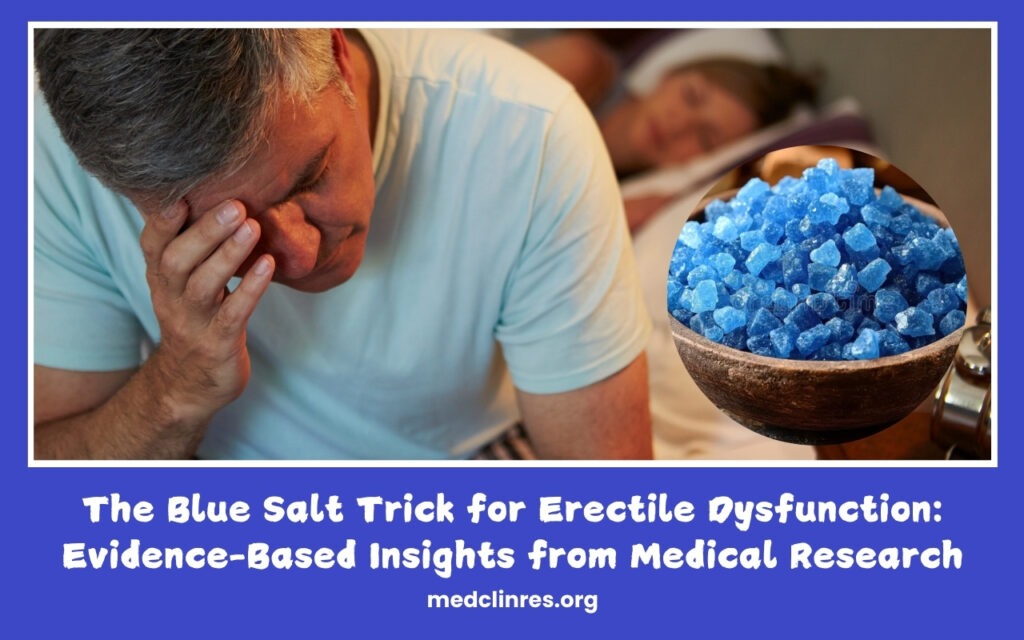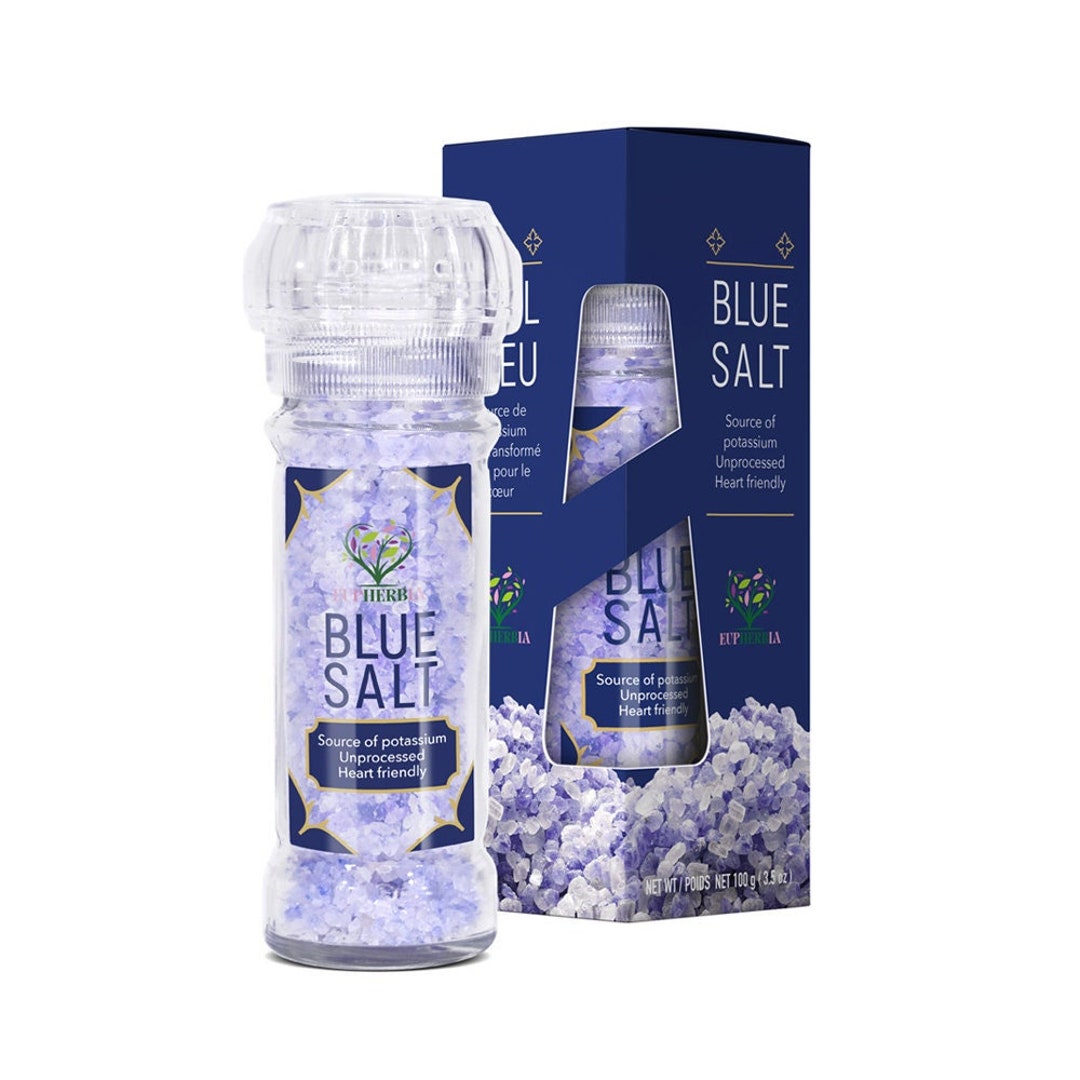Blue Salt Trick For ED: Fact Or Myth? Find Out!
Can a pinch of salt really hold the key to better blood flow and enhanced sexual performance? While the internet buzzes with the "15-second salt trick," the reality is far more nuanced, and the claims surrounding it require careful examination.
The allure of quick fixes for health concerns is undeniable, especially when dealing with sensitive issues like erectile dysfunction (ED). The digital landscape is saturated with supposed miracle cures, from exotic herbs to unusual dietary practices. Among these, the "blue salt trick" has gained some traction, promising a natural solution to a widespread problem.
Erectile dysfunction affects millions of men worldwide, making it a significant health concern. The causes can be complex, ranging from physical ailments to psychological factors. This complexity is why seeking professional medical advice is crucial when addressing ED.
The "blue salt trick" itself is an approach that involves using specific types of salt, such as Persian blue salt or Hawaiian blue salt, in the hope of improving erectile function. Proponents of this method often suggest that the unique mineral composition of these salts can dilate blood vessels and enhance circulation.
| Aspect | Details |
|---|---|
| The Claim | The "blue salt trick" promises improved erection quality through the ingestion or application of certain salts. |
| The Salts | Often involves Persian blue salt and Hawaiian blue salt. |
| The Mechanism (Proposed) | Proponents believe the mineral composition may enhance circulation. |
| Scientific Backing | Minimal to no credible scientific evidence supports the claims. |
| Health Risks | Excessive salt intake can lead to hypertension, a risk factor for ED. |
| Alternative Recommendation | Consult a healthcare provider to identify the underlying causes of ED and explore evidence-based treatments. |
| Reference Website | Mayo Clinic |
The internet's fascination with quick fixes and "miracle cures" for erectile dysfunction is well-documented. The "blue salt trick," like many other unproven remedies, falls into this category. While the concept might seem appealing, it's essential to approach such claims with a healthy dose of skepticism.
The term "blue salt trick" refers to the use of specific types of blue salts, often Persian blue salt or Hawaiian blue salt, with the hope of improving erectile dysfunction. Some claim these salts can enhance blood flow and therefore improve erection quality.
However, the scientific evidence does not support this claim. There is no credible scientific data showing that any type of "blue salt" directly treats ED. It's important to remember that our bodies are complex, and health issues like ED often have multiple underlying causes. Relying on a single, unproven remedy can be risky.
What exactly are these blue salts, and why is the idea of them being a miracle cure unlikely? Let's delve deeper into these salts, their properties, and the reasons why they may not live up to the hype. First, understanding the type of salts involved is important, as their chemical composition and mineral content are key to understanding the claims made about them.
Blue salt, particularly Persian blue salt, is a rare type of rock salt that is naturally occurring, primarily found in Iran. The unique bluish hue is due to the presence of a mineral called sylvite. Some proponents of this method suggest that the minerals present in these salts have properties that could improve blood circulation. They often propose that consuming blue salt, sometimes mixed with specific ingredients, can boost circulation, support hormonal balance, and improve overall performance.
The suggestion that blue salt improves erection quality is an oversimplification. While some sources claim that the "blue salt trick" functions by improving nitric oxide levels in the body, which may enhance blood flow. The fact is, there is no reliable scientific data to support this claim.
The idea that a simple salt can solve such a complex problem should be treated with caution. While salts like Persian blue salt and Hawaiian blue salt may provide some nutritional benefits when used sparingly in food, excessive use, especially as a home remedy, can be counterproductive. This is particularly true for individuals already dealing with health concerns such as ED.
Erectile dysfunction, as previously mentioned, is a widespread health condition affecting a significant number of men around the world. Its characterized by the inability to achieve or maintain an erection sufficient for satisfactory sexual performance.
The search for solutions is natural. However, the prevalence of misleading information on the internet can confuse anyone looking for answers. Before considering any treatment, it is crucial to seek advice from healthcare providers who can determine the root cause of ED and suggest appropriate solutions.
Excessive salt intake, in any form, is problematic. It can lead to hypertension, which is a leading risk factor for ED. Although moderate salt intake might aid circulation in certain cases, the benefits are not guaranteed, and certainly, not as a remedy for ED.
Those seeking help with erectile dysfunction should turn to medical professionals. In the pursuit of health, one should not trust untested remedies that lack scientific support. Always consult a doctor or another qualified healthcare provider.
Ultimately, the "blue salt trick" is not a reliable method for treating erectile dysfunction. While the ingredients may have certain properties, the claims of its effectiveness are not supported by science. For those experiencing erectile dysfunction, the best approach is always to seek guidance from a healthcare professional. They can help pinpoint the underlying causes and suggest evidence-based solutions.



Detail Author:
- Name : Sylvester Adams
- Email : dickens.susie@braun.net
- Birthdate : 2000-08-01
- Address : 73527 Fisher Divide Gaylordton, WV 59108
- Phone : 1-669-876-6426
- Company : Boehm Group
- Job : Parts Salesperson
- Bio : Voluptatem dolorem eos qui alias officiis. Dicta tenetur inventore eum voluptatibus tenetur et. Omnis inventore qui reiciendis nulla.